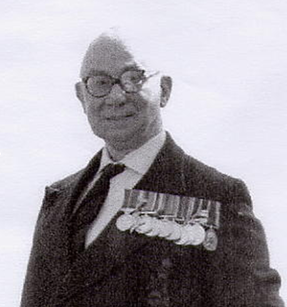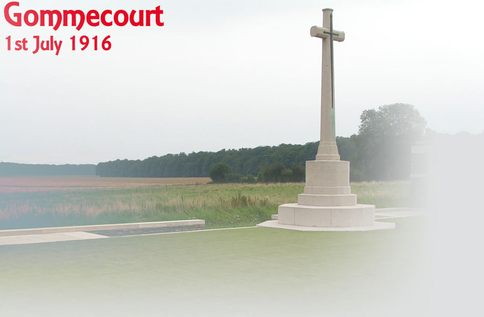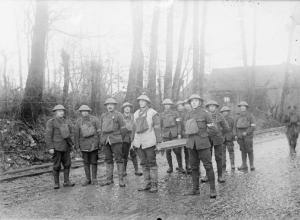The following day, the 27th MAY 1916. was Saturday. The sun was shining; in fact it was a beautiful May day. We were shelled all day long and had to stop in the trenches. I could not help comparing the difference between this Saturday and others I have spent in peace time. Sergeant Redgell, the master cook, has just been found dead. He was blown into a field.
29th MAY 1916 (Sunday?).
The buglers returned to Bayencourt where we stayed with Q.M. Stores. The battalion went into the new trench where they suffered terribly - up till to last night 2nd JUNE 1916 we had 130 killed and wounded. After being returned from this rotten trench we returned to Halloy where we stayed for five days, after which we once more moved back to the trenches at Hibutval where we stopped for 8 days when once more we returned to Halloy.
We have been very busy preparing for the attack which we are going to make on Gommecourt Wood, Arras, and today as I write
26th JUNE 1916, the boys are putting their things in order, making their Wills etc. We feel confident of victory. God is the only one who knows whether I shall get through the terrible battle or not but, if I do, I will describe the fight. If not, I’ll leave it for others more fortunate than I.
THE BATTLE OF THE SOMME.
IT IS OVER AND I AM SAFE SO I WILL DESCRIBE THE FIGHT.
We moved from Halloy to a village called St Amand nearer the line. We were due to leave here on the night of the 29th June but we were stopped for 48 hours.
30th JUNE 1916.
The last day of the month of June saw us on the move to take over the trenches. I acted in the capacity of a “Stretcher Bearer”. On our way to the trenches we passed over a plain which was alive with ‘guns’ of all sizes. The noise was awful. The boys got into the trenches and I went to the “Dressing Station” in a trench called “Wurzel Street”.
Our bombardment which had been going steadily for 7 days now began to increase and for 6 hours before we went over the top it was awful.
Now to commence on the 1st JULY 1916.
At 7 o’clock we started firing our ‘Smoke Bombs’. By this means we absolutely screen our movements from the enemy. At precisely 29 minutes 40 seconds past 7 o’clock in the morning we charged. We advanced steadily under a wicked shell and machine-gun fire and our first “wave” was almost wiped out. Over went our remaining 5 “waves” followed by the “Queen’s Westminsters” in support. Advancing steadily we took the Germans’ first line, then their 2nd and 3rd line of trenches. Our Bombers then cleared Gommecourt Wood and Gommecourt Village also had plenty of street fights.
Now as far as my regiment, the Q.V.R.’s, was concerned, we had done all we had to, namely to take 3 lines of German trenches
Now as far as my regiment, the Q.V.R.’s, was concerned, we had done all we had to, namely to take 3 lines of German trenches and the wood. Now, of course, our losses were by no means small by the time we had done all this. Now while we were attacking, the Cheshires were digging a communication trench from our line over “No Man's Land” to the German first line but, I am sorry to say, every man of them was wiped out. Now to come back to our boys. In taking the lines we captured together with the L.R.B.’s something like 400 prisoners but, alas, a failure, of which I will speak later, made it impossible for bombs and ammunition supplies to be run up and thus, about 4 o’clock in the afternoon, we commenced to lose ground very steadily until at last we reached the German first line of trenches. Here we held on till we had only 2 cartridges and about as many bombs. Then came the order to retire to our own trenches 400 yards away. Now this order nearly broke our hearts. Sergeant Major Pullein D.C.M. of ‘A’ Company called for volunteers to hold on while the rest retired, and hold on he did. Making good use of his few bombs he waited till everybody had left and then he made a dash for it getting wounded as he went. I must say the Royal Fusiliers made a most gallant attempt to supply us with ammunition but they were simply mown down. Well now, we were back where we started from but although it was, so to speak, a failure, so was it a glorious success.
To mark the 100th anniversary of World War I, we are continuing the serialisation of the diaries of Bugler John McCormack of “A” Company, 9th Battalion, County of London, Queen Victoria’s Rifle. John McCormack is Eileen Oades’ Uncle and Rosemary Monk’s Great Uncle.
We had the hardest part of the line to attack for we were up against the German Emperor’s Prussian Guards Reserves. A fine body of men. We did our job but the Division on the left and right of us failed, consequently the German artillery which should have fired on those two divisions concentrated their fire behind us thus preventing our supplies from reaching us and again they brought up another two divisions so that our case was hopeless; we had to retire. The attack stretched along a 60 mile front where in places we advanced over a mile.
Sergeant Major Pullein D.C.M. and two others have been recommended for the V.C. I should like to add that very valuable work was done by the British airmen while the fight was at its worst. You could see our machines just about 500 yards off the ground. Their courage was to be greatly admired.
Later news.
One gun during this attack fired 1,042 shells. The guns were so hot that water had to be poured down the gun to cool it and even this evaporated before it could run out the other end.
This is the end of Book 2 of the Diaries. We shall commence publishing Book 3 in the next issue.







